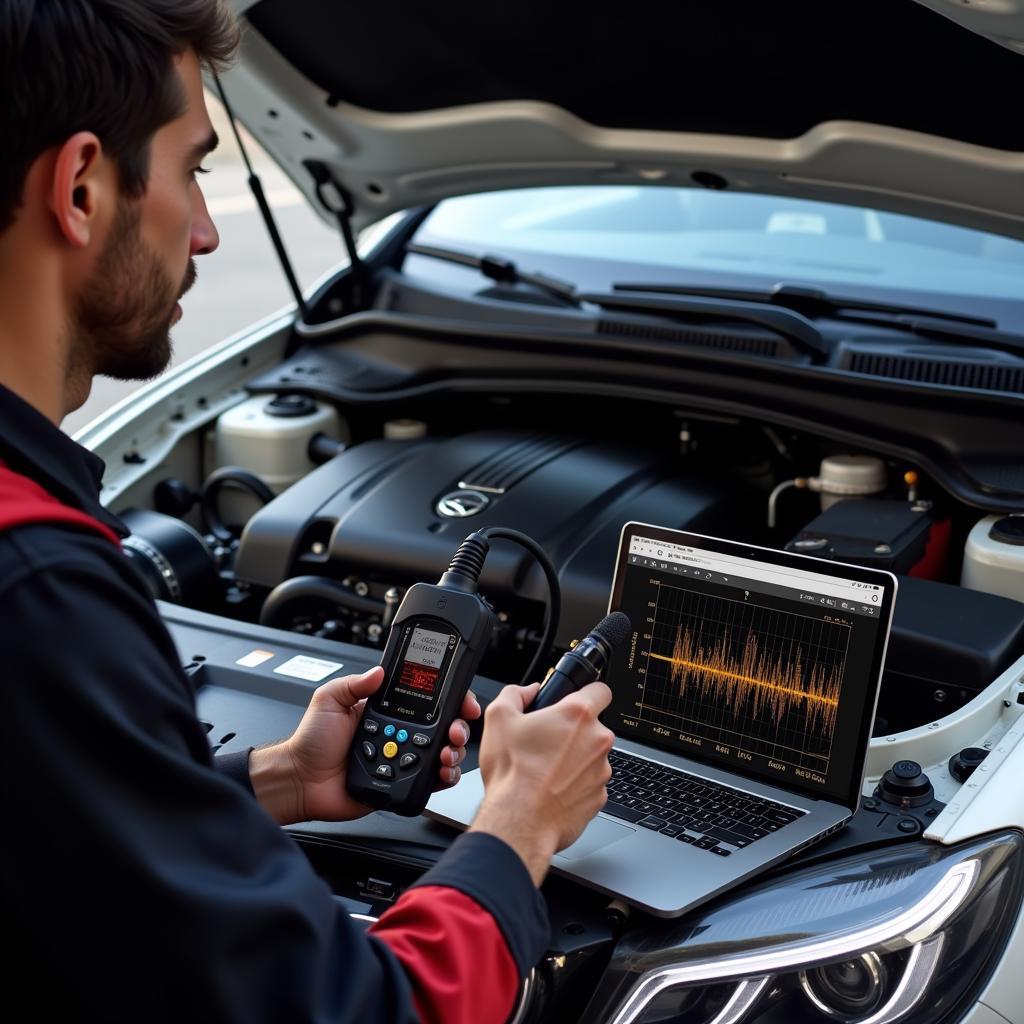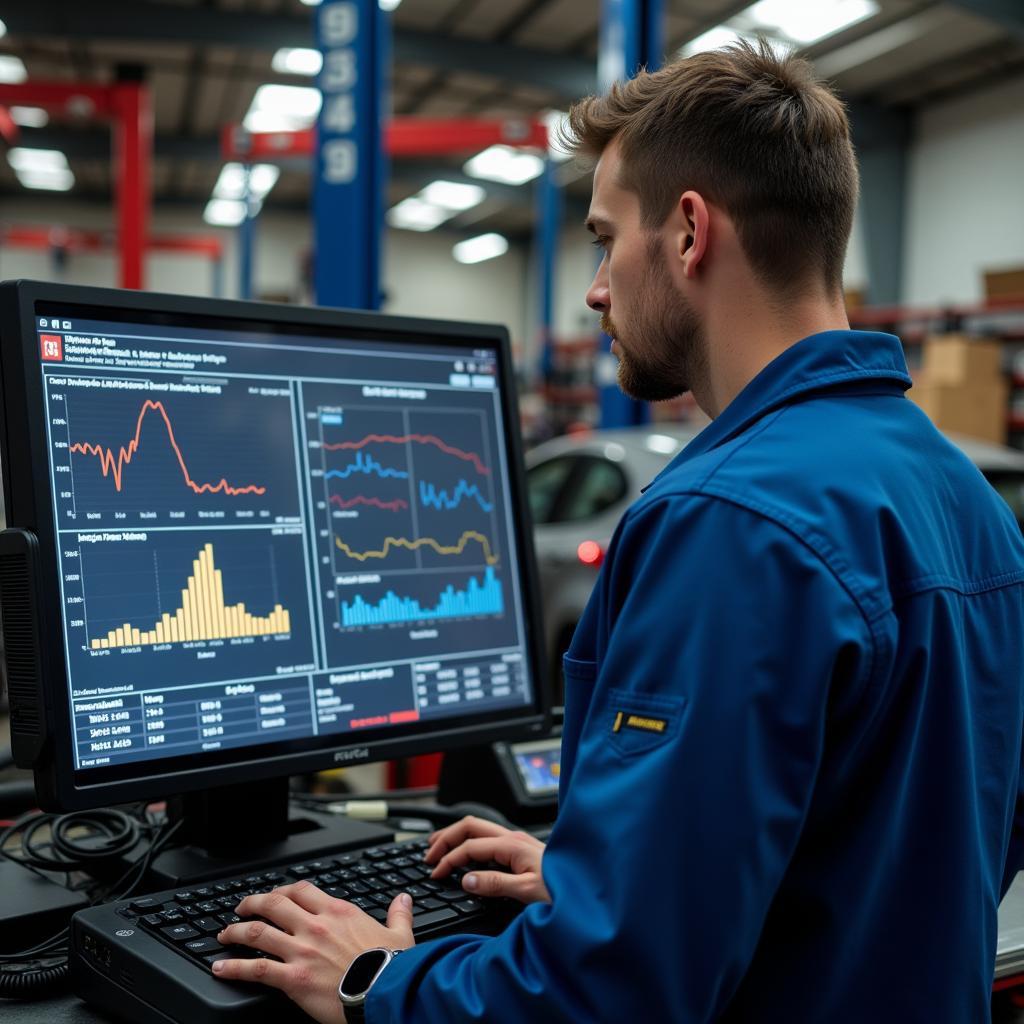Understanding the symphony of sounds your car produces can be the key to identifying and addressing issues before they escalate. While some noises might seem trivial, others could indicate underlying problems requiring immediate attention. This is where Car Noise Diagnostic Tools come into play, revolutionizing the way we diagnose and troubleshoot automotive problems.
The Science Behind Car Noise Diagnostic Tools
Gone are the days of relying solely on a mechanic’s intuition and experience to identify car troubles. Car noise diagnostic tools leverage advanced technology to analyze sounds and vibrations, providing accurate and detailed insights into the source of the problem. These tools typically consist of:
- High-sensitivity microphones: These microphones capture even the faintest sounds coming from your car’s engine, transmission, suspension, and other components.
- Data analysis software: This software processes the captured sounds, filtering out ambient noise and isolating specific frequencies associated with different car parts and potential issues.
- Diagnostic database: A comprehensive library of known car sounds and their corresponding problems helps pinpoint the root cause of the noise accurately.
 Car Noise Diagnostic Tool in Use
Car Noise Diagnostic Tool in Use
Benefits of Using Car Noise Diagnostic Tools
Utilizing a car noise diagnostic tool offers a range of benefits for both car owners and mechanics:
- Accurate Diagnosis: By analyzing sound patterns, these tools eliminate guesswork and provide highly accurate diagnoses, saving time and money on unnecessary repairs.
- Early Detection: Detecting problems early on can prevent them from developing into major, costly issues.
- Increased Efficiency: The speed and accuracy of these tools streamline the diagnostic process, enabling mechanics to work more efficiently.
- Improved Safety: By identifying potential safety hazards early, such as worn brake pads or failing wheel bearings, these tools contribute to safer driving experiences.
Types of Car Noise Diagnostic Tools
The market offers various car noise diagnostic tools to suit different needs and budgets:
- Handheld Diagnostic Scanners: These portable scanners connect to a car’s onboard computer system via the OBD-II port, providing access to diagnostic trouble codes (DTCs) and real-time data.
- Smartphone Apps: Several mobile applications utilize the phone’s microphone to analyze car noises and provide potential diagnoses.
- Professional-Grade Diagnostic Systems: These sophisticated systems, typically used by mechanics and dealerships, offer comprehensive diagnostic capabilities, including noise and vibration analysis, along with access to detailed repair information.
 Mechanic Analyzing Car Data with Professional Diagnostic System
Mechanic Analyzing Car Data with Professional Diagnostic System
Choosing the Right Car Noise Diagnostic Tool
Selecting the right tool depends on your individual needs and technical expertise:
- DIY Enthusiasts: Handheld scanners or smartphone apps offer a cost-effective solution for car owners who enjoy doing their own repairs.
- Mechanics: Professional-grade systems provide the comprehensive functionality required for efficient and accurate diagnostics in a workshop setting.
Common Car Noises and Their Potential Causes
Understanding common car noises can provide valuable clues about potential problems:
- Clicking or Tapping from the Engine: This could indicate worn-out engine components such as lifters, rocker arms, or timing chain tensioners.
- Squealing When Braking: This typically signals worn brake pads that need replacing.
- Grinding Noise When Steering: This could point to a problem with the power steering system, such as a low fluid level or a failing power steering pump.
- Humming or Growling from the Tires: This often indicates uneven tire wear, wheel bearing issues, or problems with the wheel alignment.
- Clunking Noise from the Suspension: This could be a sign of worn-out shock absorbers, struts, or other suspension components.
Tips for Using Car Noise Diagnostic Tools Effectively
To maximize the effectiveness of your car noise diagnostic tool, consider these tips:
- Use the Tool in a Quiet Environment: Background noise can interfere with the tool’s ability to pick up subtle car sounds.
- Follow the Manufacturer’s Instructions: Different tools have specific operating procedures; therefore, carefully reading the instructions is crucial.
- Combine with Visual Inspections: While sound analysis is valuable, it should be complemented with visual inspections to ensure accurate diagnoses.
Conclusion
Car noise diagnostic tools have revolutionized car maintenance by offering accurate and efficient ways to diagnose problems. Whether you’re a DIY enthusiast or a professional mechanic, understanding these tools and their capabilities can save you time, money, and potential headaches down the road. Regular use of these tools, combined with proactive car maintenance, can significantly increase the lifespan of your vehicle and ensure a smoother, safer driving experience.
car diagnostic test addiscombe
FAQs
1. Are car noise diagnostic tools compatible with all car models?
Most modern tools are compatible with a wide range of car models, especially those manufactured after 1996 that are equipped with the OBD-II port. However, it’s always advisable to check the tool’s compatibility list before purchasing.
2. Can I use a car noise diagnostic tool to diagnose problems with my motorcycle?
While some tools might offer limited functionality for motorcycles, specialized diagnostic tools are available for two-wheeled vehicles.
3. Do car noise diagnostic tools require internet access to function?
Some advanced features, such as accessing online repair databases, might require internet connectivity. However, basic diagnostic functions, including noise analysis, usually don’t require internet access.
4. How often should I use a car noise diagnostic tool?
It’s recommended to use a car noise diagnostic tool whenever you notice any unusual noises coming from your car. Additionally, incorporating these tools into regular car maintenance checks can help identify potential problems early on.
5. Are car noise diagnostic tools a worthwhile investment for car owners?
Considering the potential savings on costly repairs and the increased safety benefits, investing in a car noise diagnostic tool can be a wise decision for car owners.
free car diagnostic reader liverpool
Common Car Noise Diagnostic Situations
- Engine Misfires: A car noise diagnostic tool can help pinpoint the cylinder experiencing a misfire by analyzing engine sound patterns.
- Transmission Problems: Unusual noises from the transmission, such as whining or clunking, can be effectively diagnosed using these tools.
- Exhaust System Leaks: Detecting exhaust leaks, often characterized by hissing or roaring noises, can be simplified using a car noise diagnostic tool.
Need More Help?
Have more questions about car noise diagnostic tools or need help choosing the right one for you? Contact us via WhatsApp: +1(641)206-8880, Email: [email protected]. Our team of car diagnostic experts is available 24/7 to assist you.

Leave a Reply